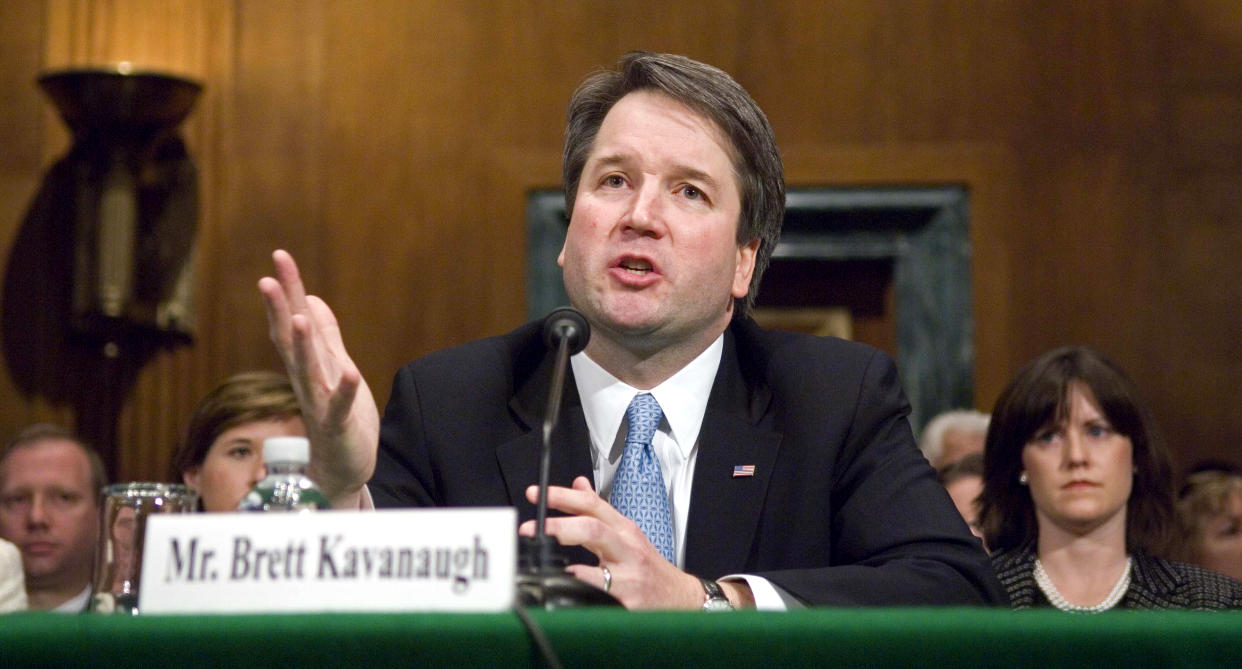Trump's Supreme Court nominee is a threat to women's rights — here's why

After days of contentious debate (and even more contentious betting), President Trump announced his associate justice nominee for the Supreme Court in primetime Monday night: Judge Brett Kavanaugh of the U.S. Court of Appeals for the D.C. Circuit. The 53-year-old Maryland native was the frontrunner to replace Justice Anthony Kennedy, 81, who resigned last month.
Kennedy, a conservative, had proved a pivotal swing vote on the court, siding with the liberal justices in a number of historic cases, such as the legalization of same-sex marriage. Although Kavanaugh once clerked for Kennedy, it’s unlikely he would follow in his philosophical footsteps if confirmed. A graduate of Yale Law and a member of the Federalist Society, Kavanugh is considered a “conservative stalwart,” who would help secure a Republican-dominated bench for decades to come.
In a speech announcing the nomination, Trump called Kavanaugh a “judge’s judge” who has written more than 300 opinions to become “one of the finest legal minds of our time.” After discussing his many accomplishments, Trump went on to applaud Kavanaugh’s “rigorous adherence to the law” during his 12 years on the D.C. Court of Appeals.
“What matters is not a judge’s political views but whether they can set aside those political views to do what the law and constitution require,” Trump said Monday. “I have found, without doubt, such a person.” The reception from the audience in the room, which included Kavanaugh’s wife and two daughters, was warm. But the Internet —specifically women’s rights advocates — wasn’t so thrilled.
Five male justices appointed by two white male presidents are going to outlaw abortion in America, three women are going to dissent, and we will all be in hell.
— Emmy Bengtson (@EmmyA2) July 10, 2018
Please stop saying that Brett Kavanaugh isn't a "bomb thrower." The Supreme Court nominee sought to bar an undocumented minor from having an abortion. Trying to force a girl to carry an unwanted fetus to term is throwing a pretty fucking big bomb, I'd say. https://t.co/ckfRDUBKWq
— Jamil Smith (@JamilSmith) July 10, 2018
Of particular concern is Kavanuagh’s stance on abortion, specifically a 2015 case, Garza v. Hargan. It involved a 17-year-old immigrant (“Jane Doe”) who entered the U.S. without her family but found herself unable to get an abortion without parental consent. After appointing a guardian — according to the American Civil Liberties Union — who granted approval, Doe was reportedly blocked from leaving the government-funded Texas facility where she was being held to obtain a termination.
Brett Kavanaugh wanted to keep a young undocumented woman jailed when the rest of his Circuit Court ordered her released to terminate her pregnancy. He’s a sure fire bet to gut #RoeVsWade and criminalize abortion. #SCOTUSNomination #scotuspick
— ilyse hogue (@ilyseh) July 10, 2018
While the court ultimately sided with Doe, Kavanaugh drafted a dissent in which he referred to the decision to permit the abortion as a “radical extension of the Supreme Court’s abortion jurisprudence.” He went on to assert that the federal government has “permissible interests in favoring fetal life, protecting the best interests of a minor, and refraining from facilitating abortion.”
As a result, abortion rights organizations see the nomination as potentially catastrophic, with Kavanaugh offering the key fifth vote needed to overturn Roe v. Wade. The concern was echoed on MSNBC’s Rachel Maddow on Monday night, where Nancy Northup, president and CEO of the Center for Reproductive Rights, said the nomination was a call to action.
In Kavanaugh’s one case on abortion he ruled against access.
“Americans need to have answers about where he stands on our basic personal liberties.” -Nancy Northup pic.twitter.com/fp5vqriXeg
— Maddow Blog (@MaddowBlog) July 10, 2018
“The president promised to appoint to the Supreme Court only justices who would overturn Roe v. Wade, and we need to assume that President Trump has done that,” Northup told Maddow. “The presumption is that he has nominated a man that he is confident will overturn Roe v. Wade, and Judge Kavanaugh’s record is not one that rebuts that assumption.”
One of the arguments against this is a transcript in which Kavanaugh refers to Roe v. Wade as “binding precedent.” But in the wake of the nomination, a reporter from Think Progress quickly pointed out he made that statement during his confirmation hearing to be a circuit court judge.
Don’t be fooled by folks who say Kavanaugh said he would respect Roe v Wade as binding precedent during his last confirmation. He said he would respect Supreme Court precedent as a CIRCUIT COURT JUDGE
That’s very different than being a Supreme Court Justice pic.twitter.com/JiCGhqBwVV
— Judd Legum (@JuddLegum) July 10, 2018
If Kavanaugh secures enough votes to make it to a confirmation hearing, his views on Roe v. Wade will most certainly be revisited. Until then, abortion advocates everywhere will be waiting.
—————
Read more from Yahoo Lifestyle:
A photo of 85-year-old Ruth Bader Ginsburg planking is going viral
The New York Times is under fire for ‘homophobic’ cartoon of Trump and Putin
‘No gays allowed’: Hardware store emboldened by Supreme Court cake ruling hangs discriminatory sign
Follow us on Instagram, Facebook, and Twitter for nonstop inspiration delivered fresh to your feed, every day.
